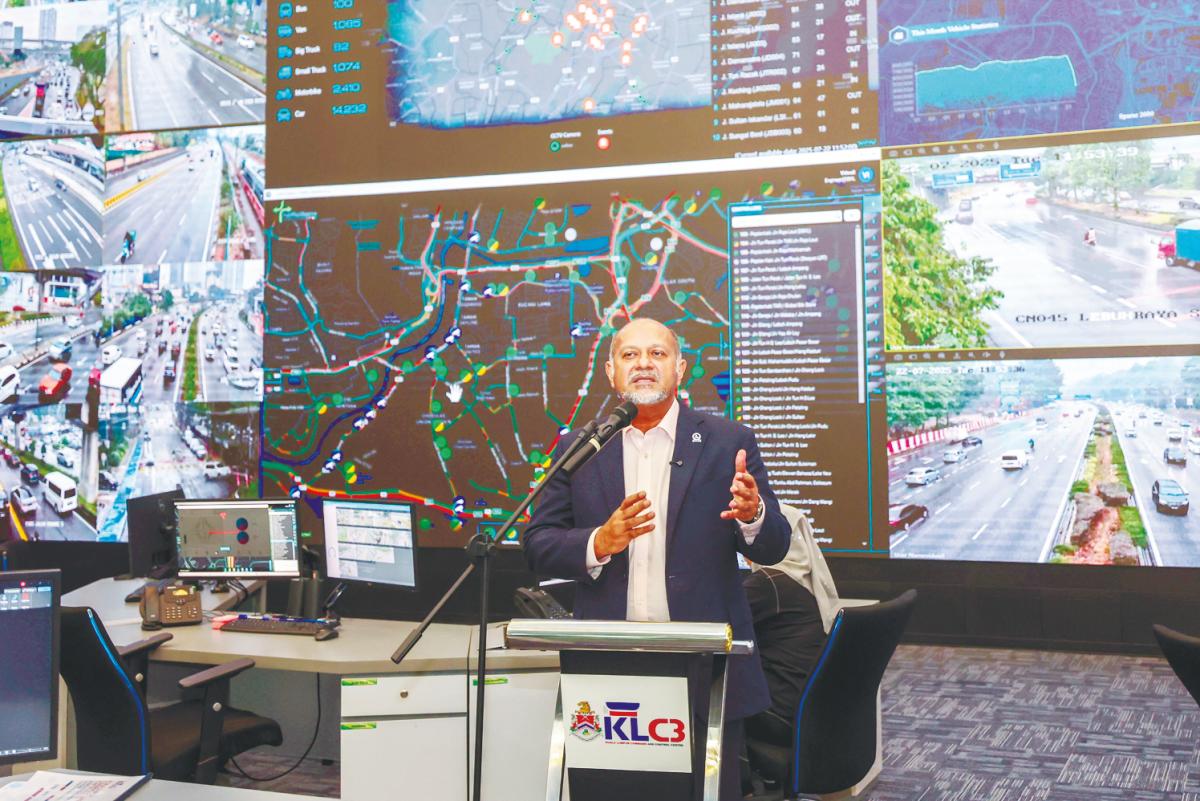KUALA LUMPUR: Malaysia is setting the stage for an artificial intelligence-driven future, beginning with Kuala Lumpur as the flagship city for smart urban governance and seamlessly integrated digital infrastructure.
As the nation’s capital transforms into a model of intelligent city planning, it signals the country’s broader commitment to harnessing AI for sustainable, efficient, and citizen-centric development.
Digital Minister Gobind Singh Deo unveiled ambitious plans to transform the capital into a model AI city during a visit to the Kuala Lumpur Command and Control Centre (KLCCC) today, laying the groundwork for a broader “Smart Nation” strategy under Malaysia Digital 2030.
“It is clear that the focus is on how we can build a command centre that enables us to deploy smart solutions,” Gobind said during a press conference at the KLCCC.
“What is important now is to bring together the existing strengths of each agency and look toward building a National Smart Nation Centre.”
The KLCCC, operated by Kuala Lumpur City Hall, serves as the city’s nerve centre for smart traffic management, emergency response and urban planning.
With AI-driven systems already in place, including real-time traffic signal adjustments, citywide surveillance analytics, and a developing “digital twin” of Kuala Lumpur, the centre marks a pivotal milestone in Malaysia’s digital transformation.
The digital twin, a virtual replica of the city, allows for real-time simulation and analysis of urban dynamics. This supports more effective planning, emergency response and resource optimisation.
It is one of several AI-enabled features integrated into Kuala Lumpur’s urban management framework.
A key enabler of the AI-driven city model is the country’s data infrastructure.
Gobind said the ministry is moving forward with a “cloud-first” policy and is working to ensure that data across ministries is digitised, centralised and AI-ready.
“We need to ensure that the data we have is in a usable form for AI,” he said.
“That means digitising not just digital data, but also analogue, visual and audio inputs. Once digitised, we need compute power and secure cloud storage to turn data into meaningful solutions.”
He pointed to Malaysia’s expanding data centre landscape, including hyperscale investments by Microsoft, Google and Alibaba, as crucial infrastructure to support this transition.
“We have a cloud-first policy because that is how we will see new technologies work in AI,” he added. “When we talk about data, we also talk about storage, security and privacy.”
The minister also highlighted the role of the Data Centre Task Force, which aims to streamline infrastructure planning and resource allocation in line with AI and cloud computing needs.
During his walkthrough of KLCCC, Gobind stressed the importance of breaking down data silos across ministries to deliver seamless services.
“Each ministry holds data that is useful. The Health Ministry has new systems to reduce waiting times by letting patients pre-book appointments, while the Transport Ministry has real-time data on buses and trains,” he said.
“Imagine combining that data to help someone get to their doctor on time, using the best available route. That’s how AI adds value.”
Gobind said integration is key to reducing inefficiencies, cutting costs and improving public service delivery.
“We must make sure that the data we have is integrated. There is no need to recreate the wheel. This allows us to move faster and optimise what we already have.”
Kuala Lumpur will host the Smart City Expo Kuala Lumpur 2025 from Sept 17 to 19, with co-hosts Malaysia Digital Economy Corporation and Digital Nasional Bhd.
The event, a satellite of the global Smart City Expo World Congress held annually in Barcelona, will position KL as a regional hub for smart city innovation.
“We are preparing now. I’ve been visiting other countries to understand their strengths and to invite them to Kuala Lumpur,” Gobind said. “We want KL to be the showcase for this region.”
The event is expected to attract AI solution providers, tech investors, and city planners, making KL a bridge for Asean digital collaboration.
Gobind concluded by reinforcing the government’s long-term vision under Malaysia Digital 2030, which aims to evolve from isolated smart city projects into an integrated smart nation ecosystem.
“We must always be ready for the technology of the next five years,” he said.
“If we move ahead without preparation, we risk falling behind. That’s why the Prime Minister’s digital transformation vision is focused on readiness, trust and secure systems.”









